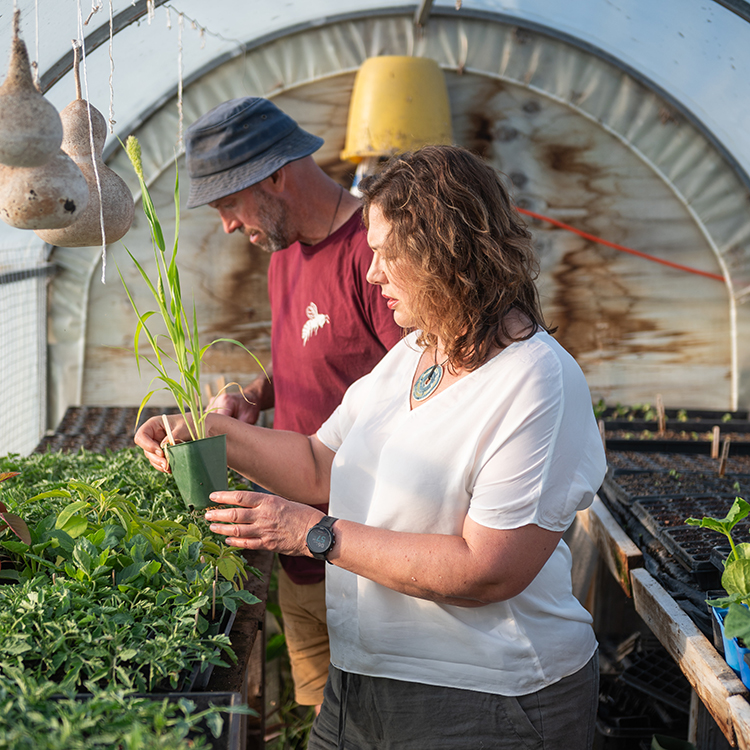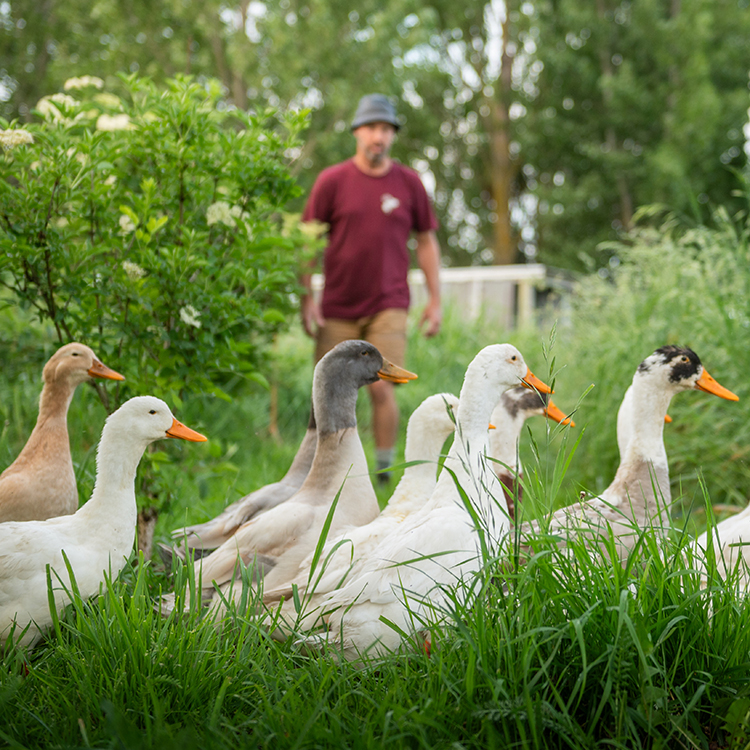
Q&A: Sam the Trap Man
We chat with Sam Gibson, aka Sam the Trap Man, about his conservation work.

Angela Clifford is co-founder of The Food Farm, a self-sufficient, permaculture farm in North Canterbury.
Living off the land is a way of life for Angela Clifford, Nick Gill and their three children. Together they have developed a plot of land in Canterbury to grow and harvest fresh, organic food sufficient to sustain themselves and whānau throughout the seasons. Their book The Food Farm – A life growing and eating our own food (Bateman Books) is a contribution to the flourishing sustainable lifestyle movement.
Where is the Food Farm?
We live under the protection of Maukatere Mt Grey, just outside Amberley in Broomfield, North Canterbury. The Food Farm is a 16-acre permaculture property that feeds us and an extended whānau. It’s a teaching farm where we run workshops, pop ups and tours to encourage other people to grow their own food.
Where did the idea of establishing a food farm come from?
We just wanted to feed our young family good, fresh, organic food and it grew from there! We’d done a Permaculture Design Certificate in Australia before we came back to New Zealand and so used those principles when deciding how to design the farm.

How long has it taken to produce enough food to live on?
It only took a few years to grow most of what we eat, but we had three small children so didn’t always have time to get everything right. By year seven the farm really hit its stride. We’re still planting and experimenting with new areas and ideas today. Our goal has never been to be ‘self-sufficient’; ‘community sufficiency’ is what we’re about.
What is permaculture?
Permaculture is nature-inspired design. It uses patterns and systems from the natural world to inspire designs that can be applied to a piece of land, a house or even a community. The underlying philosophies are earth care, people care and fair share, and there are a set of twelve principles that inform practices.
This understanding has a huge impact on our lives and underpins most decisions we make. For example, the value we place on diversity, or the importance of observing before interacting. We seek to create circular, no-waste systems on the farm and respond creatively to change, which is a really important skill these days!

Is it a full-time job?
We don’t really see it as a job; it’s a way of life. We try to spend as much time outside as possible, especially when the weather is nice and the daylight hours are long. Spring is mostly physical work, preparing beds, sowing, planting and weeding. Summer and autumn are all about harvesting and preserving so it’s a different type of busy. We get to rest in late autumn and winter.
We’ve always been Wwoofing (World Wide Opportunities on Organic Farms) hosts so have had mostly young people from around the world come to learn more about permaculture and give us a hand.
You grow vegetables, grains, berries and fruit, forage for wild food, milk cows, make butter and cheese, bake bread, preserve and pickle, raise meat…do you have a favourite job?
So many favourite jobs!
Wild food collecting has always been something we’ve done as family, so we have some really special memories, hunting, fishing, diving, collecting wild mushrooms, plants and fruit.
It’s hard to beat picking berries on a beautiful summer morning, and I love hand-milking my cow with my head against her side watching the sunrise in winter.
Baking bread and preserving is immensely satisfying, knowing that we’re capturing the vitality of the farm and providing good food to keep us well.

You grow all the food you need for your family and more, but is there anything you can’t produce?
Growing grains like wheat, oats, rice or barley on a small farm is difficult without harvesting equipment and storage. This is where community sufficiency comes in, with the wonderful Milmore Downs (producer of organic flour and other cereals) just up the road. We do grow maize for polenta and masa though.
It’s too cold here for things like avocadoes and other sub-tropical fruit. And I’m not sure I’m ready to give up coffee and chocolate, which are definitely things we can’t produce here.
Could you translate this idea to anywhere in New Zealand? How much land do people need to produce enough for themselves?
There is no magic amount of land, it’s about what you do with it and what you want to eat. We always recommend that people start small, maybe with some herbs. These can be expensive to buy but easy to grow and make a big difference to the flavour of so many meals. Once you’ve had some success, keep adding to what you grow. Do not start by ploughing up all the land you have, as you need to gain the skills and knowledge along the way.

Anyone keen might need a manual. Is this book to encourage others to develop food farms?
Yes! For example, in the book we write:
"Whatever your situation, whether you have land or just a few pots on a balcony, you can have a food farm too. You do not have to do things at the scale, extent or consistency suggested here. A single ingredient leads to a whole dish, which eventually becomes a way of life. That way of life can be hard work, but the payoff is an immense sense of satisfaction, peace and connection to the natural world. It is worth every single moment, and I cannot imagine being any other way."
Be in to win!
AA Directions has three copies of The Food Farm – A life growing and eating our own food (Bateman Books) to give away!
This story is from the Summer 2025 issue of AA Directions magazine.